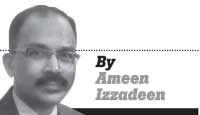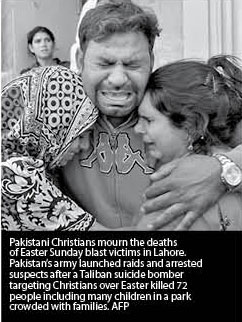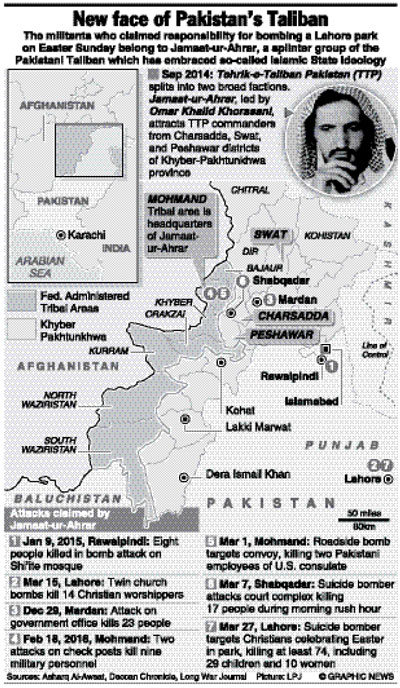Reply To:
Name - Reply Comment
 The second chapter of the Muslim holy book, the Quran, says believing in the previous scriptures is an essential feature of God-consciousness. Commentators say the verse refers to scriptures such as the Torah, the Psalms, and the Gospels; the Arabic names of these being Thourath, Zaboor and Injeel.
The second chapter of the Muslim holy book, the Quran, says believing in the previous scriptures is an essential feature of God-consciousness. Commentators say the verse refers to scriptures such as the Torah, the Psalms, and the Gospels; the Arabic names of these being Thourath, Zaboor and Injeel.
The Quran also says, “and nearest among them in love to the believers wilt thou find those who say, ‘We are Christians’ because amongst these are men devoted to learning and men who have renounced the world, and are not arrogant.”
Yet, on the Christian feast day of Easter Sunday, five days after the Brussels bombs and two days after the Baghdad bomb that hardly got any media coverage, some who call themselves Muslims and identifying themselves as members of Jamaat-ul-Ahrar or the Assembly of Free People, unleashed their unholy horror and killed more than 70 people, mostly Christians.
Their innocent victims, already victimised by the numerous social injustices that have come to symbolise the life of minorities in today’s Pakistan, were spending the evening with their families in a Lahore Park. They might have been probably still hoping against hope that the vision of Pakistan’s founder Muhammad Ali Jinnah will one day become a reality and make Pakistan a haven for all its people, irrespective of their religious, linguistic, geographic and ethnic divisions.
 Revered by Pakistanis as Quaid-e-Azam or Great Leader, Jinnah, Pakistan’s founding father, in his famous August 11, 1947 speech to the Constituent Assembly said he wanted the new country to be an inclusive and impartial government, with religious freedom, rule of law and equality for all.
Revered by Pakistanis as Quaid-e-Azam or Great Leader, Jinnah, Pakistan’s founding father, in his famous August 11, 1947 speech to the Constituent Assembly said he wanted the new country to be an inclusive and impartial government, with religious freedom, rule of law and equality for all.
He said all Pakistanis would be “. . . first, second and last a citizen of this State with equal rights,” and added that “in the course of time Hindus would cease to be Hindus and Muslims would cease to be Muslims, not in the religious sense, because that is the personal faith of each individual, but in the political sense as citizens of the State.”
But those who are behind Sunday’s terror attack care less for the vision of Jinnah, whom they have publicly denounced as a Kafir or infidel. These unholy killers’ rejection of Jinnah hardly comes as a surprise since they have chosen not to know about Islam’s commands on caring for the minorities and Islam’s early history.
It was the Christian ruler of Abyssinia, the present day Ethiopia, who sheltered the early Muslims when they were fleeing persecution in Makkah, the birthplace of Prophet Muhammad. The terrorists choose not to know this part of history or are half-baked unholy morons. How many of them have taken heed of the Quranic command and read the Christian or Jewish scriptures? If only they had read them, they would surely have found the common thread that bound the people together irrespective of their differences. Take for instance, the virtues of forgiveness in the teachings of Jesus and Muhammad. In Mathews 18-21,22, it is recorded that when Peter came to Jesus, and said, “Lord, how often shall my brother sin against me, and I forgive him -- till seven times?”
Jesus said: “I say not unto you, until seven times: but, until seventy times seven.”
Similarly, a saying recorded in the Islamic source book of Tirmidhi (Hadeeth No. 1949) says: “A man came to the Prophet and said: ‘O Messenger of Allah! How many times should I pardon my servant: The Prophet said: “Seventy times each day.”

Examples of similarities in the teachings of Jesus and Muhammad are galore. Yet the terrorists ignore these similarities and selectively interpret Quranic verses to suit their agenda and justify the killing of innocent Pakistani Christians, whereas a Muslim’s duty is to provide protection to non-Muslims living among them.
These innocent Christians living in Pakistan’s poverty stricken areas have been branded as agents of Zionists and Western Crusaders. For the terrorists, there exists a clash of civilizations -- a war between the West and Islam. Interfaith dialogue and coexistence, for them, are alien concepts. So is the rationalistic Islamic school of thought which flourished during the Abbasid Caliphate in the 8th-10th centuries – a period during which the Muslim world was known for its academic achievements and scientific discoveries. Like all religions, Islam also extolls the virtues of love, mercy, kindness and forgiveness, but for heartless terrorists and hardliners, they are simply non-existent.
When the Subcontinent was divided in 1947 into India and Pakistan, the Christians in the parts that became Pakistan decided to stay back, unlike most Hindus who crossed over to India. Today they form about 1.5 percent of Pakistan’s 190 million people, though Christian activists say the figure must be much higher because the government deliberately undercounts them.
After Independence, Christian Pakistanis had very few problems in the Muslim-dominated Pakistan, but the situation began to go bad in the early 1980s due to several reasons. First among them was the rise of Jihadi or holy war ideology in neighbouring Afghanistan in the wake of the Soviet invasion of that country. Pakistan became a main centre for jihadists on their way to Afghanistan, while, for nearly ten years, the United States, its NATO allies, Saudi Arabia and other Gulf countries funded and fomented the Jihadi ideology.
At the same time, in Pakistan, the then military ruler, Zia ul-Haq, used Islam as a cover to legitimise his illegal seizure of power and launched a programme to Islamise Pakistan.
Also at the same time, the stricter interpretations of Islam made inroads into both Pakistan and Afghanistan.
However, the situation became really bad only after George W. Bush’s war on Afghanistan in the aftermath of the 9/11 terror attacks on the United States. Instead of eliminating the Taliban and al-Qaeda, the United States’ war on terror went on to produce more jihadists. The deaths of thousands of innocent civilians during the indiscriminate NATO bombing and drone attacks pushed many jobless, uneducated youths, especially in the tribal belt, to join extremist groups and seek revenge.
The extremists are a minority in Pakistan or in any Muslim country. Most Muslims, according to a recent Pew Research, do not endorse the extremist’s ideology. (http://www.pewresearch.org/fact-tank/2015/11/17/in-nations-with-significant-muslim-populations-much-disdain-for-isis/). However, the extremists and the deviants thrive in the silence of the learned. The war is not between Islam and the West. Rather the biggest Jihad is within Islam, and it involves eradicating the deviant ideology, which is spreading like a canker. In the aftermath of the Easter carnage, Pakistan’s Prime Minister Nawaz Sharif made it clear that “spreading lawlessness through arson, anarchy, damaging government property and creating problems for people in the name of Islam and Prophet Muhammad, Peace Be Upon Him, is unacceptable… In-sha Allah, we will carry forward our mission to make Pakistan a cradle of peace, progress and prosperity.”
This is not an easy task with misguided jihadists clinging on to the ideology of Ahmad ibn Taymiyyah, also known as Ibn Taymiyyah. The 13th century sheikh rose to prominence by urging Muslims to rise against the Mongol rulers who occupied much of the then Muslim world. He also declared the Shiite Muslims to be infidels.
His teachings later influenced Muhammad Ibn Abdul Wahhab, the 18th century radical cleric from Najd (part of present day Saudi Arabia) to launch a campaign to purify Islam – a process that gave birth to what is today known as Wahhabism. Like Ibn Taymiyyah, Abdul Wahhab is also a Shiite hater. Today their followers, among them ISIS, are sowing the seeds of hatred instead of Islam’s message of love, mercy, justice and unity.